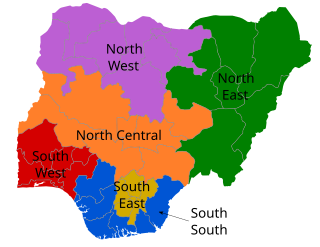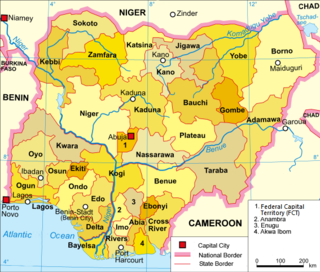
The Senate is the upper chamber of Nigeria's bicameral legislature, the National Assembly. The National Assembly is the nation's legislature and has the power to make laws, as summarized in chapter one, section four of the 1999 Constitution of Nigeria. The lower chamber is the House of Representatives.

Parliamentary elections were held in Nigeria on 12 April 2003. The result was a victory for the ruling People's Democratic Party, which won 76 of the 109 Senate seats and 223 of the 360 House seats. Voter turnout was 50%.
The following lists events that happened during 2000 in Nigeria.
See also: Timeline of Nigerian history
This article is about the particular significance of the year 2006 to Nigeria and its people. See also Timeline of Nigerian history
This article is about the particular significance of the year 2005 to Nigeria and its people.
This article is about the particular significance of the year 2008 to Nigeria and its people.

The Federal Republic of Nigeria is divided into six geopolitical zones, commonly just called zones. They are a type of administrative division grouping the country's states, created during the regime of president General Sani Abacha. Nigerian economic, political, and educational resources are often shared across the zones.
The 2015 Nigeria Professional Football League is the 44th season of the Nigeria Premier League, the top Nigerian professional league for association football clubs, since its establishment in 1972, and the 25th since the rebranding of the league as the "Professional League".
The following lists events that happened during 2007 in Nigeria.
The following lists events that happened during 2016 in Nigeria.
Events in the year 2010 in Nigeria.
Events in the year 2017 in Nigeria.
Events in the year 2018 in Nigeria.

Lists of Nigerian state governors cover the governors of states of Nigeria. The governor heads the executive branch of the state government, and can appoint people to the State Executive Council subject to the advice and consent of the State House of Assembly (Legislature). The lists include a list of current governors, lists by state, lists by period and a list of governors of former states.
The following lists of events is scheduled to happen during 2019 in Nigeria.

Lists of villages in Nigeria organised by state:
In the Federal Republic of Nigeria, state executive councils are the highest formal governmental body in state governments headed by governors.
Events in the year 2009 in Nigeria.




